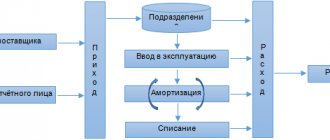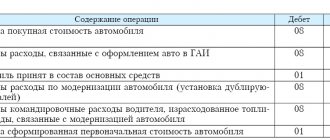Using currency
The organization has the right to use the acquired foreign currency or foreign exchange earnings at its own discretion. At the moment, the requirement for the mandatory sale of part of foreign currency earnings has been canceled (paragraph 1, part 3, article 26 of the Law of December 10, 2003 No. 173-FZ). Therefore, the organization has the right (but not the obligation):
- sell part or all of foreign exchange earnings (purchased foreign currency);
- use in settlements with non-residents (and in permitted cases with residents);
- purchased foreign currency or foreign exchange earnings received.
This follows from the provisions of Articles 6 and 9 of the Law of December 10, 2003 No. 173-FZ.
For information about what documents need to be drawn up when selling foreign currency and how to reflect such an operation in accounting, see How to reflect the receipt and use of currency and foreign currency earnings in accounting.
BASIC: difference in exchange rates
Both upon receipt and use of foreign currency (foreign exchange earnings), the organization may receive additional income (expenses). These include, in particular:
- differences between official and commercial exchange rates;
- exchange differences;
- Commission of the bank.
When purchasing (selling) foreign currency, an organization may experience a difference between the official and commercial exchange rates. It is formed if the exchange rate at which the bank buys (sells) it differs from the official rate of the Bank of Russia.
When buying a currency, a positive difference arises if the exchange rate at which the bank sold it is lower than the official one. A negative difference occurs if the purchase rate is higher than the official one. When selling currency, the opposite is true.
This follows from the systematic interpretation of the provisions of paragraph 2 of Article 250 and subparagraph 6 of paragraph 1 of Article 265 of the Tax Code of the Russian Federation.
When using currency (foreign exchange earnings), the organization may experience exchange rate differences (positive or negative). They are formed during the revaluation of property in the form of foreign currency values and debt in foreign currency.
For currency received in a foreign currency account and debt to the organization (accounts receivable) in foreign currency, a positive exchange rate difference arises if, on the date of revaluation, the exchange rate to the ruble became higher compared to the date of the previous accounting of funds in the foreign currency account or receivables.
Accordingly, a negative exchange rate difference is formed if, on the date of revaluation, the exchange rate against the ruble has decreased compared to the date of the previous accounting of funds in a foreign currency account or receivables.
For debt to the supplier or buyer (accounts payable) in foreign currency, a positive exchange rate difference arises if, on the date of revaluation, the exchange rate to the ruble became lower compared to the date of the previous accounting of accounts payable. And negative - if the exchange rate to the ruble on the date of revaluation has become higher compared to the date of the previous accounting of accounts payable in foreign currency.
There is an exception to this rule. Exchange differences will not arise if the organization receives (issues) advances. After receiving (issuing) these funds in foreign currency, there is no need to recalculate them due to changes in the exchange rate.
This follows from the provisions of paragraph 11 of Article 250 and subparagraph 5 of paragraph 1 of Article 265 of the Tax Code of the Russian Federation.
The exception for foreign exchange advances does not apply if the advance is subject to return, for example upon termination of the contract. In such a situation, the advance should be reclassified as an obligation of one party to return the previously received amount to the other party. Since the indicated amounts do not fall under the advance payment in its generally accepted meaning, they are subject to revaluation on a general basis. Similar clarifications are contained in the letter of the Ministry of Finance of Russia dated November 2, 2010 No. 03-03-06/1/683.
Include the difference between the official and commercial exchange rates for purchasing (selling) currencies in:
- non-operating income - if a positive difference occurs (clause 2 of Article 250 of the Tax Code of the Russian Federation);
- non-operating expenses - if a negative difference occurs (subclause 6, clause 1, article 265 of the Tax Code of the Russian Federation).
Using the accrual method, reflect these differences on the date of transfer of ownership of foreign currency (subclause 10, clause 4, article 271, subclause 9, clause 7, article 272 of the Tax Code of the Russian Federation). When using the cash method, include the positive (negative) difference in the base on the date of receipt of funds into the organization’s account (clause 1 of Article 273 of the Tax Code of the Russian Federation).
An example of reflection in accounting and taxation of transactions on the sale of foreign currency. The organization applies a general taxation system
Alpha LLC has US dollars in its foreign currency account. Alpha decided to sell them. The amount to sell is $1,000. The exchange rate is conditional.
On February 2, the organization sold currency at the rate of 35.2 rubles. for a dollar. The rubles were credited to the organization's bank account.
When calculating income tax, Alpha uses the accrual method. Income tax is paid monthly.
The US dollar exchange rate on February 2 was 35.4146 rubles. for a dollar.
The bank's commission amounted to 200 rubles.
On February 2, the organization’s accountant made the following entries in the accounting records:
Debit 76 Credit 52 – 35,415 rub. (1000 USD × 35.4146 rubles/USD) – funds intended for sale are debited from a foreign currency account;
Debit 91-2 Credit 76 – 200 rub. – commission fee is withheld by the bank;
Debit 51 Credit 76 – 35,200 rub. (1000 USD × 35.2 rubles/USD) – proceeds from the sale of currency are credited to the current account;
Debit 76 Credit 91-1 – 35,200 rub. – the proceeds from the sale of foreign currency are included in other income;
Debit 91-2 Credit 76 – 35,415 rub. – other expenses from the sale of currency are reflected (including 215 rubles = 1000 USD × (35.4146 rubles/USD – 35.2 rubles/USD) (the difference between the currency sale rate and the Bank of Russia rate)).
When calculating income tax for February, Alpha's accountant took into account 415 rubles. (200 rubles + 215 rubles) as part of non-operating expenses.
Situation: how to reflect foreign currency conversion when calculating income tax? The organization has an account in one currency, and settlements through it are carried out in another currency.
Reflect the differences from conversion as non-operating income (expenses).
Residents can make payments through their bank accounts in any foreign currency, regardless of the foreign currency in which the bank account is opened. If necessary, a conversion operation is performed. For example, if an account is opened in US dollars, but payments need to be made in euros, you can convert from US dollars to euros. For conversion, the rate set by the bank is taken. This procedure follows from Part 7 of Article 14 of the Law of December 10, 2003 No. 173-FZ.
Conversion, in particular, is an operation for the purchase (sale) of one foreign currency for another (Part 7 of Article 14 of the Law of December 10, 2003 No. 173-FZ). That is, in this case, the purchase and sale of foreign currencies occurs.
This means that if, when buying (selling) currency, the commercial cross rate of the bank is more profitable for the organization than the official one, it will generate non-operating income (clause 2 of Article 250 of the Tax Code of the Russian Federation). If the commercial cross-rate is less profitable, the organization must include the resulting difference in non-operating expenses (subclause 6, clause 1, article 265 of the Tax Code of the Russian Federation).
Using the accrual method, reflect the indicated non-operating income and expenses on the date of transfer of ownership of foreign currency (subclause 10, clause 4, article 271, subclause 9, clause 7, article 272 of the Tax Code of the Russian Federation).
With the cash method, reflect the positive (negative) difference on the date of receipt of funds into the organization’s account (clause 1 of Article 273 of the Tax Code of the Russian Federation).
BASIC: revaluation of property and liabilities
The difference from the revaluation of property in the form of currency values and debt in foreign currency (including for an advance that is subject to return) arises and is taken into account in tax accounting depending on the method that the organization uses: accrual or cash.
If the organization uses the accrual method, then the received currency and the debt to the buyer (supplier) in foreign currency must be converted into rubles at the Bank of Russia exchange rate on the earliest date:
- date of transaction in foreign currency (for example, repayment of debt in foreign currency);
- last day of the current month.
This rule is provided for in paragraph 8 of Article 271 and paragraph 10 of Article 272 of the Tax Code of the Russian Federation.
Positive and negative exchange rate differences arise from the revaluation of currency and foreign currency debt. Reflect positive exchange rate differences in non-operating income, negative ones in non-operating expenses.
This is stated in paragraph 11 of Article 250 and subparagraph 5 of paragraph 1 of Article 265 of the Tax Code of the Russian Federation.
The date of recognition of non-operating income and expenses in the form of exchange differences is the earliest of the following dates:
- date of transaction in foreign currency (for example, repayment of debt in foreign currency), transactions with precious metals (including on unallocated metal accounts);
- the last day of the current month in which the revaluation was made.
This is established by subparagraph 7 of paragraph 4 of Article 271 and subparagraph 6 of paragraph 7 of Article 272 of the Tax Code of the Russian Federation.
An example of how to reflect in accounting and taxation the acquisition of goods under an agreement in which the price of goods is expressed in foreign currency and payment for them is made in foreign currency. The organization applies a general taxation system
Alpha LLC entered into a supply agreement with Torgovaya LLC. Under the agreement, Hermes supplies Alpha with goods worth $100,000. Settlements under the agreement are carried out in foreign currency (US dollars). Hermes is not a resident of Russia.
The agreement provides for an advance payment form. According to the terms of the agreement, Alpha transfers an advance in the amount of 50 percent of the total payment amount ($50,000) to the Hermes account on February 2. Hermes ships goods to Alpha on February 9. Alpha transfers the remaining amount of the debt to Hermes on February 16. Title to the goods passes on the date of shipment (February 9).
The US dollar exchange rate was conditionally:
- on February 2 – 35.4146 rubles/USD;
- on February 9 – 36.3798 rubles/USD;
- as of February 16 – 34.5578 rubles/USD.
Alpha's accountant reflected the transactions under the contract in the accounting records as follows.
February 2:
Debit 60 Credit 52 – 1,770,730 rub. (USD 50,000 × RUB 35.4146/USD) – advance payment is transferred to the seller.
February 9th:
Debit 41 Credit 60 – 3,589,720 rub. (USD 50,000 × RUB 35.4146/USD + USD 50,000 × RUB 36.3798/USD) – goods have been capitalized.
February 16:
Debit 60 Credit 52 – 1,727,890 rub. (USD 50,000 × RUB 34.5578/USD) – the remaining amount of debt to the seller has been repaid;
Debit 60 Credit 91-1 – 91,100 rub. (50,000 USD × (36.3798 rub./USD rub. – 34.5578 rub./USD)) – positive exchange rate difference is reflected in income.
When calculating income tax, Alpha uses the accrual method.
On February 16, Alpha’s accountant included a positive exchange rate difference in the amount of 91,100 rubles in non-operating income in tax accounting. (USD 50,000 × RUB 36.3798/USD – USD 50,000 × RUB 34.5578/USD).
If an organization uses the cash method, then about the order in which to recalculate the currency received and the debt to the buyer (supplier) in currency, as well as reflect exchange rate differences, see How to take into account income and expenses using the cash method when calculating income tax.
Expenses in foreign currency should be treated more carefully
According to the general rules, expenses for calculating tax are written off on the last date:
- date of payment to the supplier;
- date of receipt of specific goods/materials or works/services from the supplier;
- the date of shipment of the goods to the final buyer, if goods were purchased for resale.
If you paid for the order to a foreign counterparty in foreign currency, then in order to account for the expense in the simplified tax system, the amount must be converted into rubles at the Bank of Russia exchange rate established on one of these dates.
For example, if you ordered software development abroad, then the amount of expenses in foreign currency must be recalculated into rubles at the exchange rate of the Central Bank of the Russian Federation on the date of payment or on the date of signing the act - depending on which was later.
If you purchased goods abroad, then the costs must be converted into rubles on the later of the dates - the date of payment or the date of sale.
Expenses for the purchase of fixed assets are written off according to special rules: in equal quarterly installments for one year and are taken into account on the last day of the quarter. If you purchased a fixed asset from a foreign supplier, then this expense must be written off quarterly and recalculated into rubles at the exchange rate of the Central Bank of the Russian Federation established for the last day of the quarter.
Submit reports in three clicks
Elba is suitable for individual entrepreneurs and LLCs. The service will prepare a tax return, calculate the tax and reduce it by insurance premiums.
Try 30 days free Gift for new entrepreneurs A year on “Premium” for individual entrepreneurs under 3 months
simplified tax system
Include received foreign currency earnings or advances in foreign currency as income. The amount of such income should be reflected in rubles at the Bank of Russia exchange rate on the day when the currency was credited to the transit currency account.
This procedure follows from paragraph 1 of Article 346.17 and paragraph 3 of Article 346.18 of the Tax Code of the Russian Federation and is explained in letters of the Ministry of Finance of Russia dated January 22, 2015 No. 03-11-06/2/1645 and dated January 27, 2012 No. 03-11- 06/2/10.
Positive (negative) exchange rate differences arising in accounting in tax accounting using the simplified tax system do not need to be determined. Just as there is no need to reflect them in the book of income and expenses. This follows from the provisions of paragraph 5 of Article 346.17 and paragraph 3 of Article 346.18 of the Tax Code of the Russian Federation.
Situation: how to take into account the sale of foreign currency earnings under the simplified tax system?
Include in income only the positive difference between exchange rates. Do not reflect negative differences in expenses.
Transactions related to the circulation of Russian or foreign currency (except for numismatic purposes) are not recognized as sales of goods. And if so, then there will be no income from sales when selling currency. This directly follows from the provisions of subparagraph 1, paragraph 3 of Article 39 of the Tax Code of the Russian Federation.
At the same time, if the currency is sold at a rate higher than that set by the Bank of Russia, include only the positive difference between rates in non-operating income (clause 1 of Article 346.15 and clause 2 of Article 250 of the Tax Code of the Russian Federation).
What if the currency selling rate is lower than the Bank of Russia rate? Then do not include negative exchange rate differences in expenses. After all, such expenses are not mentioned in Article 346.16 of the Tax Code of the Russian Federation.
Similar conclusions follow from the letter of the Ministry of Finance of Russia dated August 28, 2015 No. 03-11-09/49620 (brought to the attention of the tax inspectorates by letter of the Federal Tax Service of Russia dated September 15, 2015 No. GD-4-3/16204).
It should be noted that previously the financial department took a different position. The letter of the Ministry of Finance of Russia dated January 22, 2015 No. 03-11-06/2/1645 stated that rubles received into the current account from the conversion of foreign currency earnings must be included in income in the full amount. The department argued its position by saying that converting currency into rubles is nothing more than the purchase and sale of goods. However, with the release of the letter of the Ministry of Finance of Russia dated August 28, 2015 No. 03-11-09/49620, the previous clarifications seem irrelevant.
What is the essence of taxation of income from currency exchange
The grounds for paying tax in case of receiving income from currency exchange are as follows:
- clause 1 art. 228 of the Tax Code of the Russian Federation obliges the payer (individual) to pay tax (personal income tax) on income related to the sale of property;
- clause 2 art. 38 of the Tax Code of the Russian Federation establishes: what is property should be determined according to the norms of the Civil Code of the Russian Federation;
- Art. 141 of the Civil Code of the Russian Federation, in turn, determines: in what should be classified as property expressed in currency values, one must be guided by the norms of legislation on currency regulation;
- and finally, paragraph 1 of Art. 1 of the Law “On Currency Regulation” dated December 10, 2003 No. 173-FZ classifies currency as property.
Thus, having gone through the entire logical chain, we establish: transactions of individuals selling foreign currency with profit should be subject to personal income tax. Consequently, when selling currency, an individual acquires the obligation to report such sale to the Federal Tax Service and pay tax if he receives income from the transaction.
These conclusions were repeatedly confirmed by the Ministry of Finance in its letters. As an example, let us indicate the letter dated February 20, 2015 No. 03-04-06/8370.
Read more about this: “Will a tax be introduced on foreign exchange transactions?”








